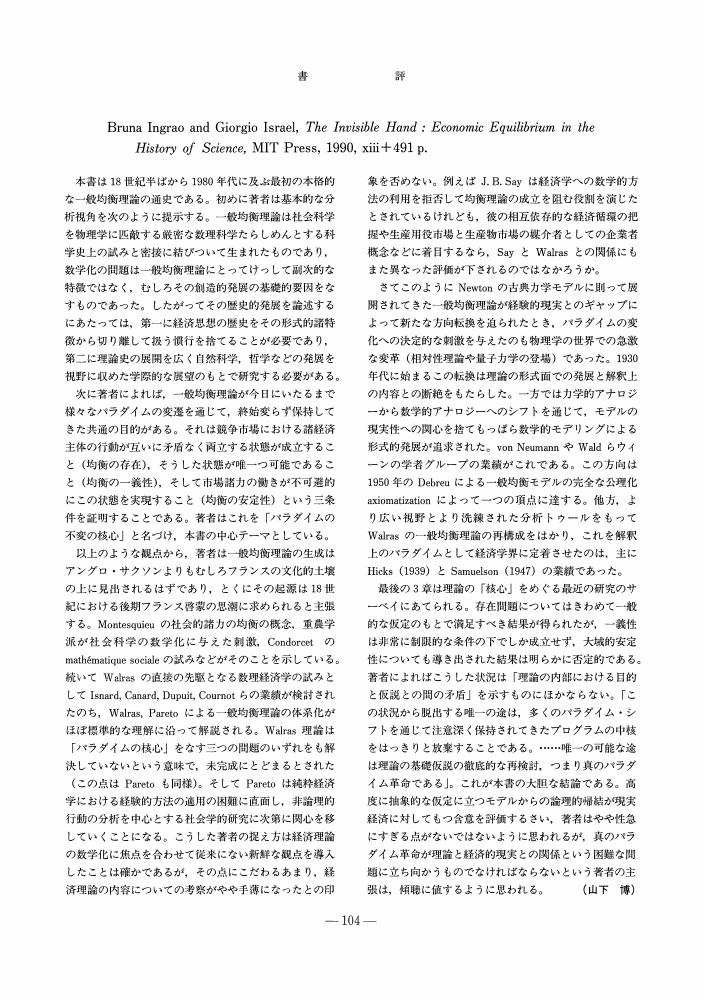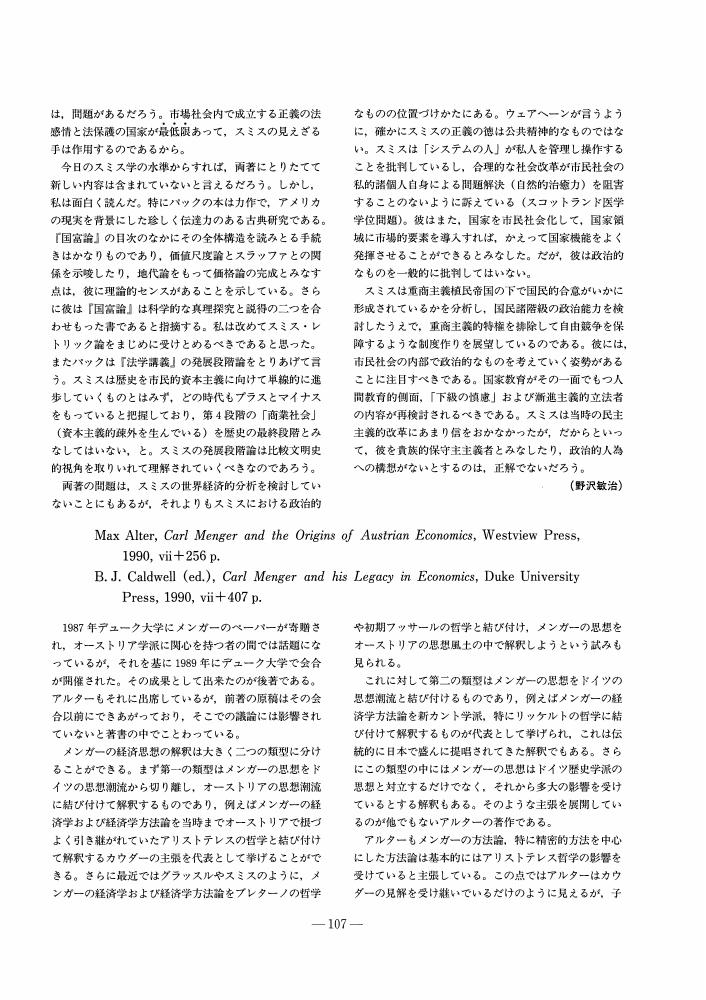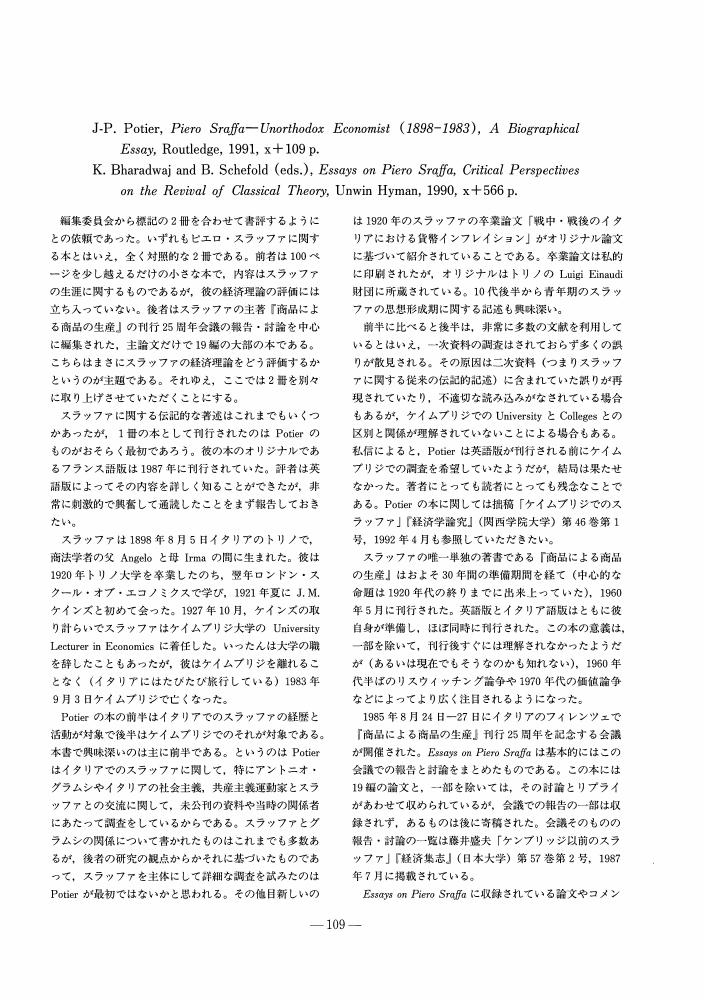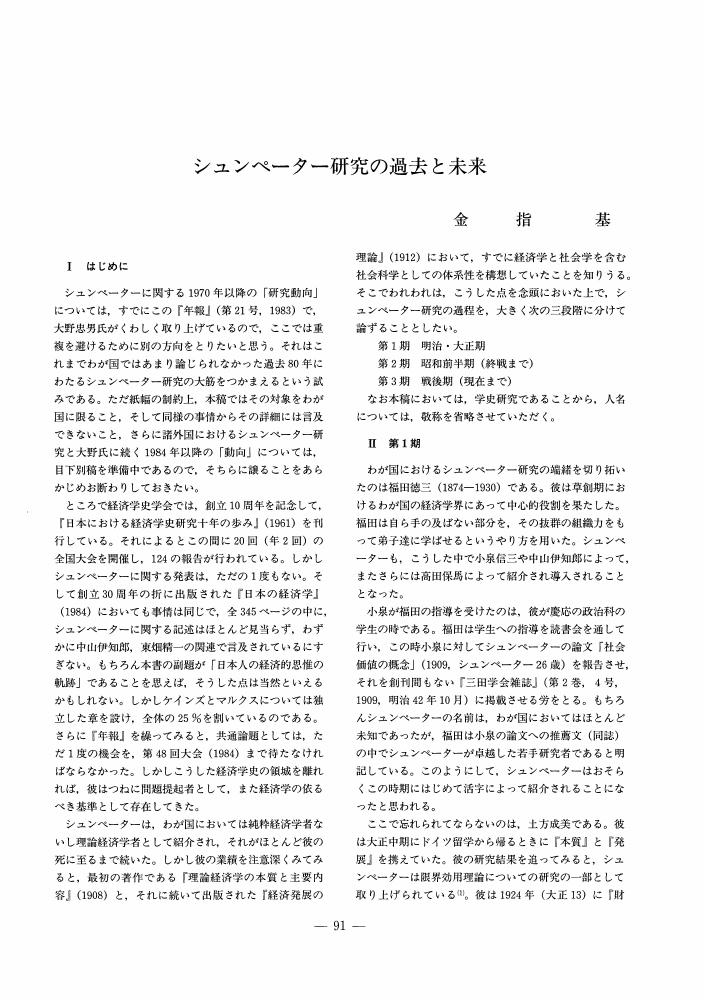1 0 0 0 OA 経済学史上の公共経済学
- 著者
- 川俣 雅弘
- 出版者
- The Japanese Society for the History of Economic Thought
- 雑誌
- 経済学史学会年報 (ISSN:04534786)
- 巻号頁・発行日
- vol.31, no.31, pp.118-123, 1993 (Released:2010-08-05)
- 参考文献数
- 30
- 著者
- 生越 利昭
- 出版者
- The Japanese Society for the History of Economic Thought
- 雑誌
- 経済学史学会年報 (ISSN:04534786)
- 巻号頁・発行日
- vol.31, no.31, pp.124, 1993 (Released:2010-08-05)
- 著者
- 坂本 達哉
- 出版者
- The Japanese Society for the History of Economic Thought
- 雑誌
- 経済学史学会年報 (ISSN:04534786)
- 巻号頁・発行日
- vol.31, no.31, pp.125, 1993 (Released:2010-08-05)
1 0 0 0 OA いわゆるバウリング版『ベンサム全集』の成立経過と編集者問題
- 著者
- 音無 通宏
- 出版者
- The Japanese Society for the History of Economic Thought
- 雑誌
- 経済学史学会年報 (ISSN:04534786)
- 巻号頁・発行日
- vol.31, no.31, pp.14-26, 1993 (Released:2010-08-05)
The first English collected edition of Bentham's works was edited and published under the ‘superintendence’ of John Bowirng. This is a commonpalce today, but little is known about the processes. Bowring was bequeathed by Bentham the greater part of manuscripts to be published after his death. However, Bowring not only excluded his religious writings from the collected edition, but also left many manuscripts unpublished. The Works was originally planned in seven volumes. But it was eventually published in eleven volumes in Part, and yet the publication of volumes was not in order. Bowring himself was absorbed in his own business during the period of compiling The Works. The editorial tasks were substantially carried out by his friends, R. Smith, T. S. Smith, R. Doane and J. H. Burton. As can be seen from the list of editors attached to the present paper, the greatest and final responsibility for editing The Works was in Burton's hands. Therefore, the first English collected edition of Bentham's works should be called Burton's edition rather than Bowring's.
1 0 0 0 OA ヴィルヘルム・ロッシャーの歴史的方法
- 著者
- 田村 信一
- 出版者
- The Japanese Society for the History of Economic Thought
- 雑誌
- 経済学史学会年報 (ISSN:04534786)
- 巻号頁・発行日
- vol.31, no.31, pp.27-33, 1993 (Released:2010-08-05)
It has been just 150 years since Wilhelm Roscher outlined the historical method of economics in his Grundriß. With the publication of this manifestoprogramme and his lifework in five volumes, System der Volkswirtschaft (1854-1894), where he put the historical method in practise, Roscher is considered to be the founder of (Older) Historical School of German Economics. His ultimate goal of the historical method was to discover the development laws of nations as a part of natural laws in analogy to human physical development by comparing all civilized nations in the world history. On the problem of what Roscher would achieve by the historical method, however, it is important to make clear that he did not intend at all to construct the new other theories than classical economics, but only to supplement classical-abstract doctrines by a great many of historial-concrete investigations and development laws, and to educate legislators' or administrators' sense in understanding the complexity of economic phenomena that could avoid them falling “Ricardian Vice” (J. Schumpeter). We must pay attention to the fact that Roscher could completely take over the theories of classical economics built on “self-interest”, because he firmly believed as Lutheran a harmony between “self-interest” and “public-interest”. In this sense, “the spiritual initiator” would be more appropriate term than the “founder of Historical School of German Economics”.
1 0 0 0 OA トマス・アクィナスの経済論
- 著者
- 森岡 邦泰
- 出版者
- The Japanese Society for the History of Economic Thought
- 雑誌
- 経済学史学会年報 (ISSN:04534786)
- 巻号頁・発行日
- vol.31, no.31, pp.47-57, 1993 (Released:2010-08-05)
We have two interpretations about the concept of the just price of St. Thomas Aquinas: the one is a cost of production theory (objective value), in which production costs represented mainly or only wages just sufficient to allow producers or traders to live in a manner befitting their status in society, the other, utlity theory (subjective value) or a subjective nature of value determined by “usefulness”, in fact a market price.We adopt an anthropological aproach to the matters of medieval age and anlayse attentively the differences of Thomas' texts and Aristotle's original ones. As a result we have Thomas' model of society.According to his model, the cost of production theory is more sustainable in terms of products made by man, on the other hand we recognise a moment of subjective nature of value in terms of non-products, which however pertain to only his ontological hierarchy. In addition the nature of subjectivity is not that of utility in the modern sense, but necessity of community, which is typical of a traditional society. We conclude that the just price of Thomas is mainly founded on labour and costs and in the same time can be a market price in his model of society.
1 0 0 0 OA マーシャルにおける組織と分配
- 著者
- 藤井 賢治
- 出版者
- The Japanese Society for the History of Economic Thought
- 雑誌
- 経済学史学会年報 (ISSN:04534786)
- 巻号頁・発行日
- vol.31, no.31, pp.58-66, 1993 (Released:2010-08-05)
- 参考文献数
- 12
The importance of Organization in Marshall's economics has gradually come to be recognized. This paper carries further this line of thought as to develop an implication for his theory of distribution.Factors of production employed within different organizations (firms or industries) can never be expected to earn the equal rates of reward in Marshall's system. Thus, the notion of ‘capital in general’ or that of ‘labor in general’ is without substance except in a special case. No normal rate of profit nor of wage is determined in a market, but is defined only in relation to the representative firm. The role of ‘free capital’ which had best be interpreted as capital outside an organization is to determine the rate of interest as a market price for using capital and to apply it to existing capital within different organizations to estimate the amount of net interest which must be paid out of whatever profits firms realized.There is no confusion between the rate of interest and the rate of profit as sometimes claimed. The real problem lies in the confusion between the money rate of interest and the real rate of interest arising from the ambiguous character of ‘free capital’.
- 著者
- 四野 宮三郎
- 出版者
- The Japanese Society for the History of Economic Thought
- 雑誌
- 経済学史学会年報 (ISSN:04534786)
- 巻号頁・発行日
- vol.30, no.30, pp.112-113, 1992 (Released:2010-08-05)
1 0 0 0 OA Rita McWilliams Tullberg (ed.), Alfred Marshall in Retrospect, Edward Elgar, 1990, viii+228p.
- 著者
- 西岡 幹雄
- 出版者
- The Japanese Society for the History of Economic Thought
- 雑誌
- 経済学史学会年報 (ISSN:04534786)
- 巻号頁・発行日
- vol.30, no.30, pp.102, 1992 (Released:2010-08-05)
- 著者
- 藤井 賢治
- 出版者
- The Japanese Society for the History of Economic Thought
- 雑誌
- 経済学史学会年報 (ISSN:04534786)
- 巻号頁・発行日
- vol.30, no.30, pp.103, 1992 (Released:2010-08-05)
- 著者
- 山下 博
- 出版者
- The Japanese Society for the History of Economic Thought
- 雑誌
- 経済学史学会年報 (ISSN:04534786)
- 巻号頁・発行日
- vol.30, no.30, pp.104, 1992 (Released:2010-08-05)
- 著者
- 橋本 比登志
- 出版者
- The Japanese Society for the History of Economic Thought
- 雑誌
- 経済学史学会年報 (ISSN:04534786)
- 巻号頁・発行日
- vol.30, no.30, pp.105, 1992 (Released:2010-08-05)
- 著者
- 野沢 敏治
- 出版者
- The Japanese Society for the History of Economic Thought
- 雑誌
- 経済学史学会年報 (ISSN:04534786)
- 巻号頁・発行日
- vol.30, no.30, pp.106-107, 1992 (Released:2010-08-05)
- 著者
- 東清 二郎
- 出版者
- The Japanese Society for the History of Economic Thought
- 雑誌
- 経済学史学会年報 (ISSN:04534786)
- 巻号頁・発行日
- vol.30, no.30, pp.107-108, 1992 (Released:2010-08-05)
- 著者
- 松本 有一
- 出版者
- The Japanese Society for the History of Economic Thought
- 雑誌
- 経済学史学会年報 (ISSN:04534786)
- 巻号頁・発行日
- vol.30, no.30, pp.109-110, 1992 (Released:2010-08-05)
- 著者
- 白銀 久紀
- 出版者
- The Japanese Society for the History of Economic Thought
- 雑誌
- 経済学史学会年報 (ISSN:04534786)
- 巻号頁・発行日
- vol.30, no.30, pp.110-111, 1992 (Released:2010-08-05)
1 0 0 0 OA 19世紀フランス古典派経済学
- 著者
- 栗田 啓子
- 出版者
- The Japanese Society for the History of Economic Thought
- 雑誌
- 経済学史学会年報 (ISSN:04534786)
- 巻号頁・発行日
- vol.30, no.30, pp.76-80, 1992 (Released:2010-08-05)
- 参考文献数
- 33
1 0 0 0 OA 最近の『資本論』形成史研究
- 著者
- 内田 弘
- 出版者
- The Japanese Society for the History of Economic Thought
- 雑誌
- 経済学史学会年報 (ISSN:04534786)
- 巻号頁・発行日
- vol.30, no.30, pp.81-85, 1992 (Released:2010-08-05)
1 0 0 0 OA ケンブリッジ学派における2つの流れ
- 著者
- 平井 俊顕
- 出版者
- The Japanese Society for the History of Economic Thought
- 雑誌
- 経済学史学会年報 (ISSN:04534786)
- 巻号頁・発行日
- vol.30, no.30, pp.86-90, 1992 (Released:2010-08-05)
- 参考文献数
- 49
1 0 0 0 OA シュンペーター研究の過去と未来
- 著者
- 金指 基
- 出版者
- The Japanese Society for the History of Economic Thought
- 雑誌
- 経済学史学会年報 (ISSN:04534786)
- 巻号頁・発行日
- vol.30, no.30, pp.91-95, 1992 (Released:2010-08-05)
- 参考文献数
- 4















